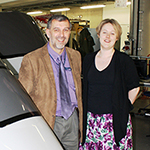Don Harris is a Professor of Human Factors at Coventry University and Head of the new Human Systems Integration Applied Research Group.
Professor, author, consultant and winner of 3 awards for work leading to advances in aerospace. Don has just spent the last three years working with COMAC, the new Chinese aircraft manufacturer on the design and certification of their flight decks.
Can you tell us a little bit about the research group and how it came about?
We typically work with high value, high risk systems. The Faculty of Engineering and Computing offers solutions to problems – the human component is inherent in any engineering solution. You can’t separate the human from the engineering, but the group takes this several steps further than just designi
ng and evaluating something. It’s also about specifying training systems, having the right organisational structures and using the right people – making everything work together, as a whole.
What background does your research group stem from?
We are all mainly from an Aerospace background, but we’ve previously done work in the automotive, defence, oil and gas, maritime, petrochemical and nuclear industry sectors.
What sort of projects are you working on at the moment? What are the significant ones?
Currently there are various aerospace projects and applications underway and some defence-related training work looking at specifying collective training needs and evaluating outcomes.
How will your research directly affect Coventry University?
Our integrated systems approach to human factors gives us a unique slant. For example, if you look at IKEA products they talk about comfy chairs or if you look at ergonomics of cars people talk about the design of the sat nav system or the ease of operation of controls, but there is a lot more to it than that. This is a very 90’s view of the subject that looks just at individuals and equipment. There is still lots we can still do in this area – for example loads of exciting opportunities for technology transfer from hi-tech industries such as aerospace and defence – but now it’s now all about systems. This is where the cutting edge is.
We look at through-life approaches to systems. There is no point in designing the best equipment in the world if we haven’t got the right people, the right training and the right organisational structures to support it all. We have also realised that there are many different stakeholders within a system – operators, management, maintainers, fare-paying customers – and each has different views, so part of the Human Factors task is to manage and accommodate these views. And it’s not just about safety and comfort – early human system analysis can same billions of dollars in a large acquisition programme. Numbers coming out now show that early human factors analysis produces between 30 and 50:1 return on investment. There is an exceptionally good economic case for doing human system integration. We can help save them a lot of money by reducing through-life costs.
In terms of client base, can you say who the major people you are working with are?
At the moment I am just about to go to DLR (the German Aerospace Laboratory) in Hamburg to do some work followed shortly after by a trip to Shanghai to discuss doing more work with COMAC. We work a lot with DSTL and the Irish Aviation Authority and we are just about to start some PhD projects on aircraft ground handling and cyber security.
What can the research group offer for others?
Well, we put the group together essentially so we can take an integrated, through-life approach to the human component associated with any engineering-based application. So we can look at all the implications and how this changes the whole dynamics of an organisation. This is what human system integration is essentially about. It can enhance safety, save money and improve performance.
How important is Human Factors research?
You don’t do human factors as a standalone thing. Everything that everyone does involves a human. Things are done by humans to satisfy human needs. Good human factors is all about specifying things properly very early on, right at the design stages. You do the correct human factors analysis, then it impacts in a positive way on many other issues as well as directly on operations, such as maintenance, disposal and also maintaining the environment.
Where do you see this research expanding into in the future?
Human factors is about looking at the human side of an integrated system solution. The next place we will be starting work in the very near future is on safety and security. But almost by definition we will work across groups, for example manufacturing, aerospace, computing, automotive – even architecture and the built environment!




Comments are disabled